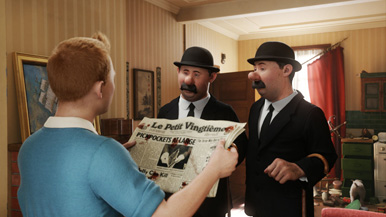Movie Review: The Adventures of Tintin
By Matthew Huntley
January 2, 2012
BoxOfficeProphets.com

Unfortunately, he might have waited too long, because The Adventures of Tintin is somewhat a victim of bad timing. Even 30 years after Raiders, it lives in that and other films’ shadows. Don’t get me wrong - Tintin is fun, energetic and great-looking in parts, but overall, it feels like something we’ve seen before, and so it comes off as hackneyed and inconsequential, even though its technical ambitions are of the highest caliber. But these can’t compensate for the trite narrative. Yes, the Tintin comic series did come out long before Raiders, but the film comes at a time where we’ve already seen what the fantasy-adventure genre can offer, and I’m afraid Tintin doesn’t quite live up to the standard.
Like most adventure stories of this nature, the plot involves the heroes trying to uncover a mystery that leads to long-lost treasure. When Tintin (Jamie Bell), a Belgian journalist of an ambiguous age (he’s likely in his early 20s) purchases a model ship from an old man on the street, he’s unaware it holds a clue from a legendary pirate that leads to sunken gold. That is, until two suspicious men - a tall, lithe fellow named Sakharine (Daniel Craig), and another portly one named Barnaby (Joe Starr) - desperately try to buy it back from him. When Tintin refuses, his apartment is ransacked and he’s taken aboard the SS Karaboudjan. Luckily his loyal fox terrier, Snowy, is there to rescue him, which is more than can be said of Thompson (Simon Pegg) and Thomson (Nick Frost), a pair of clueless detectives obsessed with catching a local pickpocket.
On the ship, Tintin meets Captain Haddock (Andy Serkis), a perpetual drunk who’s also being held prisoner by Sakharine. Booze is both Haddock’s blessing and curse - it blocks and triggers stories his grandfather taught him about his ancestors that could potentially lead to the buried treasure. We learn there are two other ships like the one Tintin bought and each contains a hidden scroll with valuable information. Tintin and Haddock team up to find the other two, all while dodging bullets; jumping off ships; floating in the middle of the ocean; hijacking a seaplane; crash-landing in the Sahara Desert; and racing around the city of Bagghar on a motorcycle and sidecar in a monumental chase scene, which is presented in a single take. The latter is the movie’s most inspired sequence and reminds us why Spielberg is such a good choice as director. The man can choreograph action like no other in order to provide moments of pure rush and excitement. We just wish Tintin had more of them.
Outside of the Bagghar chase sequence, and after the initial mystery and intrigue of the plot is set up, Tintin more or less boils down to a series of standard action scenes, the kind we’ve seen in other Spielberg and Hollywood fantasy-adventure movies. It pains me to write this, because I can only imagine the level of difficulty involved in making a movie like this and because Spielberg has obviously poured his heart and soul into it. But these aren’t enough, nor are the 3D or motion capture animation. Perhaps I’ve become so indoctrinated by these formats that it takes a completely original narrative to make them stand out, though I’m still not convinced it had to be filmed this way in the first place. Did Spielberg and producer Peter Jackson see something I overlooked in the way motion capture might have enhanced the story? Did it allot them liberties live action couldn’t? If Indiana Jones could be played by a real actor on real sets, and be so much more effective, why couldn’t Tintin?
For me, the problem with most motion capture is in the eyes and how they still seem to move independently of the actor’s body. As a result, the characters appear as doll-like creatures instead of humans and their motion feels unnatural. Not that it has to be 100% realistic, but these flaws draw negative attention to themselves. Only “Avatar” seems to have gotten this aspect of the format right.
And is it just me, or is Tintin himself a bland hero? Maybe I’m splitting hairs, but he’s rather dry and vanilla and part of me just didn’t care about him. Whether or not he’s like this in the comic book series makes no difference, because on film, we need a conduit into the story that’s interesting and dimensional, but Tintin leaves much to be desired. He’s not terribly charming or funny and we don’t know much about him. What are his weaknesses, fears or desires? The screenplay by Steven Moffat, Edgar Wright and Joe Cornish doesn’t bother to develop his character beyond what the plot requires, but they should know that once a connection to the hero is established, we become much more invested in what happens in the story in general.
I’m giving The Adventures of Tintin a negative review, yet I hardly think it’s a bad movie. It simply doesn’t bring enough fresh or original moments to the table. The movie has plenty of energy, ambition and innocence to be enjoyed by younger viewers who haven’t had the pleasure of seeing Raiders of the Lost Ark or the like yet, but when they do, Tintin will likely seem pale in comparison. Perhaps it’s because I’m not familiar with the source material, which is much more popular in Europe, that the movie wasn’t able to win me over. But even that shouldn’t matter. As an admirer of the filmmakers and the genre, Tintin simply didn’t pay off the way I’d hoped. If it’s any consolation, I recognize that it tries very hard.